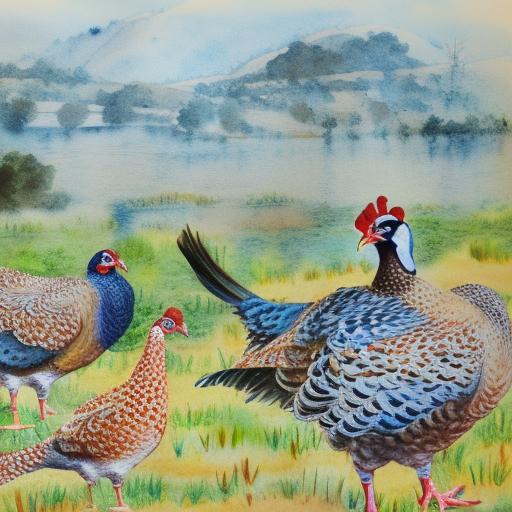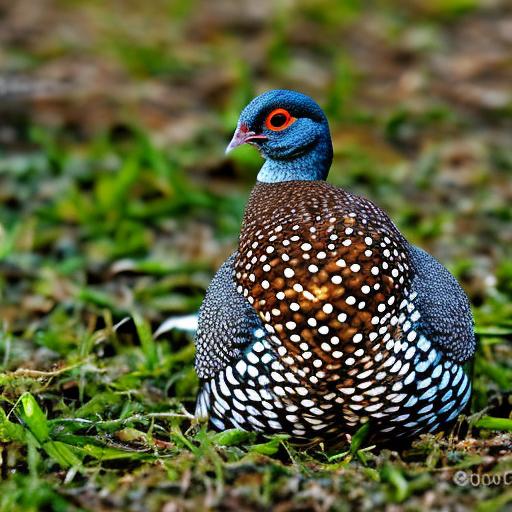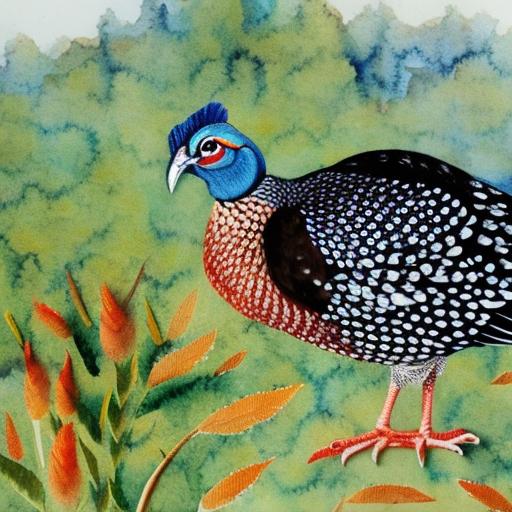Guinea fowl breeding is a rewarding and fulfilling endeavor for those interested in raising these unique and fascinating birds. Guinea fowl are known for their striking appearance, with their speckled feathers and distinctive helmet-like casque on their heads. They are also valued for their ability to control pests such as ticks, flies, and other insects, making them a valuable addition to any farm or homestead. Breeding guinea fowl can be a profitable venture, as they are in demand for their meat, eggs, and pest control services. Additionally, guinea fowl are relatively low-maintenance birds, making them an attractive option for those looking to raise poultry without the intensive care required for other types of birds.
When embarking on guinea fowl breeding, it is important to understand the specific needs and requirements of these birds in order to ensure their health and well-being. This includes selecting the right breeding stock, providing appropriate housing and care, understanding the breeding and incubation process, and knowing how to care for guinea fowl chicks. Additionally, it is important to be aware of the common challenges that can arise when breeding guinea fowl, and how to address them effectively. With the right knowledge and preparation, successful guinea fowl breeding can be a highly rewarding experience.
Key Takeaways
- Guinea fowl breeding is a rewarding venture that requires careful selection of breeding stock and proper care and management.
- When selecting breeding stock, it is important to choose healthy, active birds with good conformation and desirable traits for breeding.
- Housing and care for breeding guinea fowl should include providing adequate space, protection from predators, and a balanced diet to ensure optimal breeding conditions.
- Breeding and incubating guinea fowl eggs require attention to temperature, humidity, and turning of the eggs for successful hatching.
- Caring for guinea fowl chicks involves providing warmth, proper nutrition, and protection from predators to ensure their healthy growth and development.
- Common challenges in guinea fowl breeding include predation, disease, and infertility, which can be managed through proper planning and proactive management.
- In conclusion, successful guinea fowl breeding requires attention to detail, proper care, and proactive management to ensure healthy and productive flocks.
Selecting Breeding Stock
Selecting the right breeding stock is crucial for successful guinea fowl breeding. When choosing breeding birds, it is important to look for individuals that are healthy, active, and free from any obvious signs of disease or deformities. It is also important to select birds that exhibit the desired traits for breeding, such as good conformation, strong fertility, and a calm and docile temperament. Additionally, it is important to consider the genetic diversity of the breeding stock in order to avoid inbreeding and maintain the overall health and vigor of the flock.
When selecting breeding stock, it is also important to consider the specific goals of the breeding program. For example, if the goal is to produce guinea fowl for meat production, then selecting birds with good body conformation and rapid growth rates would be important. On the other hand, if the goal is to produce guinea fowl for pest control purposes, then selecting birds with strong foraging abilities and a keen sense of alertness would be more important. Ultimately, the key to successful guinea fowl breeding lies in selecting breeding stock that possesses the desired traits and characteristics for the specific goals of the breeding program.
Housing and Care for Breeding Guinea Fowl
Proper housing and care are essential for the health and well-being of breeding guinea fowl. When it comes to housing, guinea fowl require a secure and predator-proof coop or shelter that provides protection from the elements and ample space for roosting and nesting. The coop should also have good ventilation to prevent moisture buildup and ensure good air quality. Additionally, providing access to outdoor space for foraging and exercise is important for the overall health and happiness of the birds.
In terms of care, guinea fowl require a balanced diet that includes a high-quality commercial poultry feed supplemented with fresh fruits, vegetables, and access to insects and other natural forage. It is also important to provide clean water at all times and to regularly clean and maintain the coop to prevent the buildup of waste and parasites. Additionally, providing regular health checks and preventative care, such as vaccinations and deworming, is important for maintaining the overall health of the breeding flock.
Breeding and Incubating Guinea Fowl Eggs
Breeding guinea fowl involves allowing the birds to naturally mate and produce fertile eggs for incubation. Guinea fowl are known for their strong mating instincts, and they will typically pair off and mate on their own without much intervention. However, it is important to ensure that there is a good ratio of males to females in order to maximize fertility rates. Once the eggs are laid, they can be collected and placed in an incubator or under a broody hen for hatching.
When it comes to incubating guinea fowl eggs, it is important to provide the right conditions for successful hatching. This includes maintaining a consistent temperature and humidity level throughout the incubation period, as well as regularly turning the eggs to ensure proper development. It is also important to monitor the development of the embryos through candling in order to identify any potential issues or problems. With proper care and attention, guinea fowl eggs can hatch successfully, leading to healthy chicks that will grow into productive members of the breeding flock.
Caring for Guinea Fowl Chicks
Caring for guinea fowl chicks requires attention to their specific needs in order to ensure their health and well-being. When raising guinea fowl chicks, it is important to provide a warm and secure brooder environment that is free from drafts and predators. The brooder should also have access to fresh water and high-quality chick starter feed that is specifically formulated for young poultry. Additionally, providing ample space for exercise and socialization is important for the overall development of the chicks.
As guinea fowl chicks grow, it is important to gradually introduce them to outdoor environments in order to acclimate them to their future living conditions. This includes providing access to outdoor pens or runs that are secure from predators while still allowing the chicks to forage and explore. It is also important to monitor the health of the chicks closely and provide any necessary preventative care, such as vaccinations and deworming, in order to ensure their long-term health and productivity as members of the breeding flock.
Common Challenges in Guinea Fowl Breeding

While guinea fowl breeding can be a rewarding endeavor, there are also common challenges that breeders may encounter along the way. One common challenge is predation, as guinea fowl are vulnerable to attacks from predators such as foxes, raccoons, and birds of prey. It is important to implement effective predator control measures, such as secure fencing, guard animals, or predator deterrents, in order to protect the breeding flock from harm.
Another common challenge in guinea fowl breeding is disease management. Guinea fowl are susceptible to a variety of poultry diseases and parasites, such as coccidiosis, respiratory infections, and mites. It is important to implement strict biosecurity measures, such as quarantine protocols and regular health checks, in order to prevent the spread of disease within the breeding flock. Additionally, providing a clean and sanitary living environment for the birds can help reduce the risk of disease outbreaks.
Conclusion and Tips for Successful Guinea Fowl Breeding
In conclusion, guinea fowl breeding can be a highly rewarding endeavor for those interested in raising these unique and valuable birds. By selecting the right breeding stock, providing appropriate housing and care, understanding the breeding and incubation process, and knowing how to care for guinea fowl chicks, breeders can set themselves up for success in their breeding program. It is also important to be aware of common challenges such as predation and disease management in order to effectively address these issues as they arise.
For those looking to embark on guinea fowl breeding, there are several tips that can help ensure success. First, it is important to do thorough research on guinea fowl husbandry and breeding practices in order to gain a solid understanding of their specific needs and requirements. Additionally, networking with other experienced guinea fowl breeders can provide valuable insights and support along the way. Finally, maintaining a proactive approach to preventative care and problem-solving can help breeders address any challenges that may arise in their breeding program. With dedication and attention to detail, successful guinea fowl breeding can be a fulfilling and profitable venture for poultry enthusiasts.
If you’re interested in guinea fowl breeding, you may also want to explore the topic of “rent-a-chicken coop” as an alternative option for poultry enthusiasts. This article from Poultry Wizard discusses the benefits and considerations of renting a chicken coop, which could provide valuable insights for managing guinea fowl breeding environments. Check out the article here to learn more about this innovative approach to poultry care.
FAQs
What is guinea fowl breeding?
Guinea fowl breeding refers to the process of raising and breeding guinea fowl for various purposes such as meat, eggs, pest control, and ornamental purposes.
What are the benefits of guinea fowl breeding?
Guinea fowl breeding can provide a sustainable source of meat and eggs, as well as natural pest control for farms and gardens. Additionally, guinea fowl are known for their ornamental value and can be raised for their unique and attractive appearance.
What are some important considerations for guinea fowl breeding?
Important considerations for guinea fowl breeding include providing proper housing, nutrition, and care for the birds. Additionally, breed selection, breeding methods, and disease prevention are important factors to consider.
What are some common breeds of guinea fowl for breeding?
Common breeds of guinea fowl for breeding include the Helmeted Guinea Fowl, the Vulturine Guinea Fowl, and the Crested Guinea Fowl. Each breed has its own unique characteristics and suitability for different purposes.
What are some tips for successful guinea fowl breeding?
Some tips for successful guinea fowl breeding include providing a balanced diet, ensuring proper housing and space, and implementing good breeding practices such as selecting healthy breeding stock and providing proper nesting areas for egg laying.
What are some common challenges in guinea fowl breeding?
Common challenges in guinea fowl breeding include predation, disease, and proper management of breeding pairs. Additionally, guinea fowl can be sensitive to stress and may require careful handling and management.
Meet Walter, the feathered-friend fanatic of Florida! Nestled in the sunshine state, Walter struts through life with his feathered companions, clucking his way to happiness. With a coop that’s fancier than a five-star hotel, he’s the Don Juan of the chicken world. When he’s not teaching his hens to do the cha-cha, you’ll find him in a heated debate with his prized rooster, Sir Clucks-a-Lot. Walter’s poultry passion is no yolk; he’s the sunny-side-up guy you never knew you needed in your flock of friends!







